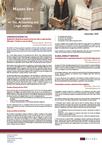
Mazars Info September 2020
CORPORATE INCOME TAX
Deadline for filing the corporate income tax return is approaching
Ultimately 1 October in case of refund!
The Minister of Finance granted an extension of the due date for filing the corporate income tax return to 29 October 2020 from 24 September 2020 (https://financien. belgium.be/nl/Actueel/opening-biztax-2020-verlenging-indieningstermijn-venb-rpb-bniven).
The 1 month filling extension was provided because "Biztax"—the e-filing government platform—required certain technical changes in response to the COVID-19 pandemic and was only accessible as from 6 July 2020. The extended filing due date also applies to the tax returns of legal entities and non-resident companies and this irrespective whether the taxpayer or a mandated external tax accountant files the CIT return. Tax returns to be filed between 24 September and 29 October 2020 can also benefit from the extension.
Worth noting and not always known to taxpayers is however that income tax returns that result in a tax refund and that are filed no later than 1 October 2020 will receive priority treatment. These companies will receive the tax assessment earlier than the returns filed after 1 October 2020 in order to support the liquidity and solvability of those taxpayers. Taxpayers that intend to apply the loss carryback are also encouraged to file their CIT return before 1 October 2020 for a faster refund.
An individual filing delay can be applied for with the Belgian tax authorities. Practice, however, shows that such individual delays are rarely granted, and even then only in exceptional situations (i.e. extraordinary events behind anyone’s control). It is uncertain whether the Belgian tax authorities will accept late approval and filing of the BEGAAP annual accounts with the National Bank due to COVID-19 pandemic reasons as an extraordinary event that would allow another 2-week or 1-month extension to end November 2020, taking the general exceptional filing extension into account.
Transfer pricing local form 275 LF
By the same due date, the transfer pricing local form ‘275 LF’ has to be filed by Belgian companies (and Belgian non-resident entities) that are part of an international or a Belgian group for which, in the financial year preceding the financial year most recently closed, at least one of the following criteria was exceeded (as determined on the basis of the annual accounts of the Belgian entity, i.e. not on a consolidated level):
- operating and financial income, excluding non-recurring income, in the sum of EUR 50 million;
- a balance sheet total of EUR 1 billion;
- an annual average headcount of 100 full-time equivalent employees.
Given the complexity in case of a completion of Part B of the Local Form, we propose no longer to wait until the last weeks or days before the due date to prepare the CITR and/ or the 275LF.
Severe sanctions for late filing
The sanctions for late filing or absence of filing of a CITR by a resident or non-resident company have significantly increased as from assessment year 2019. It is therefore important to make sure that the filing deadline is met, not filing the tax return in due time is not a valid option under Belgian tax law. Filing a complete, timely and well-documented tax return is not only important to avoid a limited administrative penalty, but also to avoid unnecessary scrutiny by the Belgian tax authorities. In case of late filing or incomplete filing of the Belgian CITR, the Belgian tax administration has different legal means to impose several sanctions:
- An administrative penalty
- An ex-officio tax assessment
- An increase of the CIT due
- An extension of the tax bill assessment period
As such, a company may no longer able to offset its tax base with any tax deductions carried-forward if a tax increase of at least 10% was established as a result of an ex officio assessment, for instance in case of exceeding the filing due date with 1 week. The Belgian tax administration can apply these sanctions cumulatively.
If you would like our assistance with the preparation and/or the review of the CITR or 275LF, you can already contact us to kick-off the CIT return finalization.
GLOBAL MOBILITY SERVICES
Immigration news: reopening borders for non-EU with single permit
On August 20, 2020, the Belgian Immigration Service has decided to reopen the Belgian borders for non-EU citizens. Employees holding a single permit can from now on apply again for a Visa D via their local embassy. As a result, these permit holders are again able to travel to Belgium to start their employment.
All the Belgian embassies were recently informed about this by the Belgian Immigration Service. Non-EU employees can therefore travel to Belgium again after they have received their Visa D.
Of course, the general rules applicable to all foreigner travelling to Belgium must also be followed. These people will therefore have to complete the Passenger Locator Form (PLC), have themselves tested and undergo a mandatory 14-day quarantine.
Consumption vouchers: extension of the regulation
Consumption vouchers granted by an employer to his employees, will under certain conditions, not qualify as salary for social security purposes. Consequently, no Belgian social security contributions (employer and employee) will be due on the value of these vouchers.
The conditions and the scope of these vouchers have been amended / extended following the law of July 30, 2020. We provide hereafter a brief summary of these changes:
1. Previously, these vouchers could only be used for catering, cultural and sports purposes. Recently, the scope of the vouchers was extended to small businesses where goods and services are offered and sold to the customer who is physically present at the business. Additionally, some other conditions still need to be met in this respect:
- The establishment must have been closed for at least 1 month due to COVID-19 measures.
- It must be a micro company in accordance with article 1:25 of the new Belgian companies and associations code.
- It is not required that the concerned retail stores / outlets have legal personality.
2. Prior to the law of July 30, 2020, consumption vouchers could only be delivered on paper. Recently, this has been amended whereby consumption vouchers can also be issued electronically taking certain conditions into account (i.e. the employee must be able to consult the balance and validity period of the vouchers, no user costs for the employee, ...).
3. A favourable tax regime for both the employee and the employer has been introduced through the law of July 30, 2020 for consumption vouchers provided that these vouchers are granted according to the rules stipulated for the exemption of Belgian social security purposes. If so, the vouchers are exempted from Belgian income tax in the hands of the employee and the voucher costs are tax deductible for corporate income tax purposes in the hands of the employer granting the vouchers.
LEGAL
Competition by company directors after their dismissal
In a judgment dated 25 June 2020, the Court of Cassation took a remarkable decision on the possibility for company directors to develop competitive activities after the end of their directorship. A former director of an insurance broker had started a new office with his wife. After his departure, it appeared that a large proportion of the clients of the old firm had joined him. The agreement between the insurance broker and the director did not impose any non-competition obligation after the end of the term of office. However, the Antwerp Court of Appeal ruled that the former director was subject to a post-contractual non-competition obligation and prohibited him from acquiring clients from his old firm for a period of one year after his dismissal. The Court of Cassation broke this order. The judgment of 25 June 2020 provides a clear overview of the applicable principles:
Non-competition obligation for directors in office
A director may not develop activities that are competitive in relation to the activities of the company in which he or she holds a directorship. This rule is not explicit in the law, but there is a legal obligation to perform contracts in good faith that applies to the contract between the director and the company. It follows from this that the director is bound to the company by a loyalty obligation which includes, unless otherwise agreed, not being allowed to perform any activity that competes with the activity performed by the company as long as the directorship lasts.
No non-competition obligation for directors after the end of their term of office
A director’s duty of loyalty ends at the end of his or her term of office. Thereafter he or she may develop competitive activities, unless contractually agreed otherwise. In addition, the general rules on competition continue to apply and former directors may not commit acts of unfair competition.
In order to prevent directors from developing competitive activities following the termination of their term of office, it is appropriate to expressly provide for this non-competition obligation in their agreement with the company.
If you would like our assistance with the review of your current director agreements or require further advice in this matter, please contact us.

